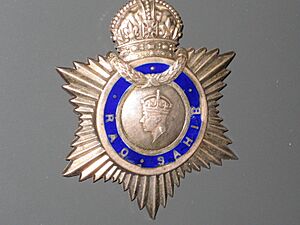Rai Sahib facts for kids
Quick facts for kids Rao Sahib |
|
|---|---|

Title Badge for Rao Sahib
|
|
| Presented by | |
| Country | |
The Rai Sahib or Rao Sahib was a special award given in British India. It was like a big "thank you" from the British government. This award honored people who did great things for their community or for the country. These awards were given out when India was under British rule, before it became independent in 1947.
The name "Rai" or "Rao" means "King" or "Chief," and "Sahib" means "leader" or "master." So, it was like calling someone a "respected leader." From 1911, people who received this award also got a special badge to wear.
This award was usually the first step in a series of honors. People could later receive higher titles like Rao Bahadur or Dewan Bahadur. The different spellings, like Rai Sahib or Rao Saheb, were used to match how people pronounced the words in different parts of India. For example, Rai Sahib was common in North India, while Rao Sahib was used in South India and Maharashtra. All these titles stopped being given out in 1947 when India became independent.
Contents
Who Received This Award?
Many people who helped their communities or served the public received the Rao Sahib title. Here are a few examples of notable individuals:
Public Servants and Leaders
- Rao Bahadur Satyendra Nath Mukherjee: He was awarded Rai Saheb on June 4, 1934. He became the first Indian Deputy Commissioner of Police in Calcutta.
- Rao Sahib Ayyathan Gopalan: Known as "Darsarji," he was a doctor and chief surgeon in Kerala. He also worked as a medical school professor and even served as a magistrate. He received his award on November 17, 1917.
- Nagendra Kumar Bhattacharyya: He served as the Commissioner of Berhampore from 1932 to 1948 in West Bengal.
- Kuppusamy Kodandapani Pillai: He was a Deputy Collector and helped people moving from Madras to other countries.
Community Helpers and Innovators
- Abraham Pandithar: He was a famous Tamil music expert, composer, and traditional medicine doctor. He lived from 1859 to 1919.
- Deep Chand Bahman: He was awarded Rai Sahib for being an excellent poet of "saang," a type of folk theater.
- Gidugu Venkata Ramamurthy: He was a Telugu linguist, meaning he studied the Telugu language.
- Dukhan Ram: An Indian eye doctor and a legislator. He also received the Padma Bhushan, another high honor.
Business and Education Leaders
- Ramnath Goenka: A well-known newspaper editor and businessman from Bombay.
- Mulji Jagmal Sawaria: A miner from Bilaspur, Chhattisgarh.
- Mahabir Prasad Misra: An educator from the Madhubani District.
- Ganpatrao Narayanrao Madiman: A respected businessman and banker from Hubli, Karnataka.
- Harilal Shamji: A generous person and industrialist from Raigarh.
See also
 | Audre Lorde |
 | John Berry Meachum |
 | Ferdinand Lee Barnett |

